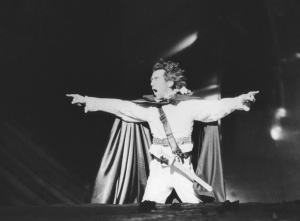Arrogance, Humility and the Professional Singer
Every singer has heard the word “Diva”. Even in Rock, Pop and Jazz the word is familiar. On the negative side, it denotes an attitude of arrogance, egoism, self-involvement and a bit of aggression. Does it even have a positive side? Many whom I’ve heard use the term use it with a shade of admiration. It denotes the ability to set clear borders for others. It implies the ability to skillfully negotiate and, especially in the classical singing world, it signifies an ability to say no to unreasonable or unhealthy demands from those who may not have your best interests at heart.
I know it was true for me in my singing days and I’ve heard it reported from countless other singer colleagues; we soloists are often considered arrogant by others. Example; you go to a party where some don’t know you. Inevitably, when you mention you’re a professional singer you are asked to sing something. OK, sometimes you do it. If you don’t feel like it and say so, the reaction is often; “You’re a professional singer. You do it because you love it. How can you be so arrogant as to not share that with others?” Another example; we tend to have louder than average speaking voices with a great deal of carrying power. We also have a, shall we say, ‘theatrical’ entrance style. To those who are insecure, or self-conscious, this comes off as arrogant or egotistical in the most negative ways. Over and over again in the definitions I’ve read appears the word superior. Arrogance implies thinking you’re better than others. Someone who enters the room who’s having a great day, or who is enthusiastic or passionate about something can’t be considered arrogant, no matter how it looks to the more insecure. At the same time, there are singers out there who do actually consider themselves ‘better’. I don’t mean ‘better’ singers, I mean ‘better’ human beings. And that’s exactly the question with the word “Diva”; is it a behavior or a state of being?
As a behavior it’s open to the interpretation of the perceiver with all his/her filters, prejudices, generalizations and delusions. If it’s a state of being it’s between you and yourself. Gnoti Sauton – Know Thyself – is an ongoing process difficult to judge accurately from the outside without REALLY getting to know someone. Being confident, being charismatic, embracing passion and vitality is part and parcel of what we do as singers, or we would have chosen another profession. As singing teachers the question is; how can we cultivate an inner state in our students which is balanced, authentic and ‘right’ FOR THAT STUDENT? This entails going through a stage (which perhaps goes on for years) in which we make a somewhat arrogant impression. It does not entail feeling superior as a human being.
This is where humility comes in. Cultivating humility is just as important to a creative artist as is embracing passion and vitality; Humility in the face of the composer, Humility in the face of Higher Creative Forces (including the Soma!), in whatever form you can perceive this, Humility in the face of those who have something important to teach you, Humility in the face of the entire process of emotional expression that singing is. I’m not speaking of the false humility that comes from making yourself smaller than you are. I’m not speaking of false humility in the form of placating extreme temperament in those around you. I’m speaking of humility which enables, which motivates and which inspires. Socrates referred to it when he said: "The only thing I know is that I know nothing." Einstein referred to it when he said: “What I see in Nature is a magnificent structure that we can comprehend only very imperfectly, and that must fill a thinking person with a feeling of humility.” I especially like C.S Lewis’ “Humility is not thinking less of yourself, it's thinking of yourself less.” The reason that appeals to me is that in the act of singing well (or speaking well, or teaching well), I’ve experienced a state of “Self-Forgetfulness! One of the signs of this is a kind of “Time-Warp”; time goes by ultra-fast. I believe this kind of “Flow” is a necessary component of creativity, ESPECIALLY for performing artists. Many masters I’ve known have eloquently and convincingly described this phenomenon.
Another expression of humility is what I’ve heard described by many great singers; the sense that you CAN (not must) learn from anyone whose path you cross. Of course you could choose not to, but this ability or attitude puts you eye to eye with even the most seeming immature, the most obnoxious the most narcissistic individuals you come across. So that balance between Diva-Behavior/arrogance and humility, the ability to shift between one and the other, as the context requires is the mark of the flexible singer. Humility is an important component of the “Diva” in its best sense, as is a strong sense of “Self”, which often seems like arrogance.
Evan Bortnick Wiesbaden
